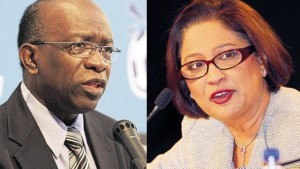
(L-R) WARNER … a deal was brokered between Galbaransingh and Ferguson and Persad Bissessar. PERSAD BISSESSAR … Warner is desperate
PORT OF SPAIN, Trinidad (CMC) — Prime Minister Kamla Persad Bissessar has described as a “damp squib littered with lies and more lies” a news conference held by her former national security minister Austin ‘Jack’ Warner linking her to a deal that led to the controversial section 34 in Trinidad and Tobago.
In September, 2012, Parliament repealed the controversial section that had the effect of allowing people, whose trial had not started after a 10-year period, to walk free and a verdict of not guilty entered against their names.
Critics said that the clause was aimed at supporting businessmen Ish Galbaransingh and Steve Ferguson, who have been described as financiers of the ruling United National Congress (UNC), the biggest partner in the four-member coalition People’s Partnership government.
The two are facing fraud and laundering charges relating to the re-development of the Piarco International Airport in 2001. They are also wanted in the United States on a number of related charges.
Their attorneys have petitioned the local court to have the charges against them dismissed, citing Section 34 of the Act.
Warner told reporters that he was present at a meeting when the deal was brokered between Galbaransingh and Ferguson and Persad Bissessar, through their alleged generous donations in exchange for Section 34 .
He claimed that eight million dollars (One TT dollar =US$0.16 cents) had been handed to Persad Bissessar in cheque form over several occasions, including at a meeting at which he, Warner, claimed to have been present.
Warner has, in the past, claimed that Section 34 was a deliberate attempt by the government to establish an escape route for Ferguson and Galbaransingh.
Warner said that former justice minister Herbert Volney, who was fired in 2012 as a result of the controversy, was essentially a scapegoat for the affair.
Warner, reading from an affidavit stamped by Justice of the Peace Anthony Soulette, said discussions were ongoing between 2010 and 2012 as to how Galbaransingh and Ferguson would be helped, including the possibility of court appearances and incarceration, to make it appear the issue of extradition was being pursued.
“This was also to impress upon the US government that there was no compromise in this regard,” said Warner.
Warner added that in May 2012 Volney brought
the controversial Administration of Justice Miscellaneous Provisions Bill to Cabinet where it was read and approved by the majority, and where it was described by Persad-Bissessar as a “worthy achievement”.
But in a statement, Prime Minister Persad Bissessar claimed that Warner’s press conference “was a damp squib littered with lies and more lies.
“I am responding at the earliest opportunity in the hope this will ensure that these outrageous claims by Warner are treated with the contempt they deserve,” she said, adding “let me state very clearly and unequivocally that these accusations are false and without any foundation whatsoever.
“I hope that observers will by now have noted the pattern of increasingly farfetched claims being made by this man and how quickly each set of his claims unravels once the facts are known. Everybody knows his present plight and why he is becoming so desperate. He is a stranger to the truth”.
She said the controversial section was passed unanimously by Parliament in 2012 and subsequently repealed within 24 hours of receiving advice from the DPP to do so.
“As I stated at the time, I dealt with the minister as I needed to do. He had given erroneous advice to the Cabinet and had failed to accurately represent the position and views of the CJ and DPP. It gave me no pleasure to dismiss him, but all ministers in my Government are accountable and when tough decisions have needed to be taken, I have taken them”. Persad Bissessar said that Warner could take his allegations to the Integrity Commission as well as to the police with the evidence he claims to have.
“This will put a stop to this nonsense. I have asked my lawyers to review today’s press conference and take the requisite action to stop this malicious misinformation once and for all,” she added.
Meanwhile, in a statement on Wednesday, Volney said Section 34 was conceived by him “with no urging from the political directorate of the country. It was hammered out in the Senate by Opposition, Government and Independent benches, and it was a parliamentary oversight not to include white-collar crime in the schedule of exempted crime.
“It was intended to force the hand of the DPP to prosecute long-outstanding matters where oppression, by delay, was becoming an issue. It was juridically conceived by me, given my background on the bench. If there was anything wrong with it in principle, I was to accept responsibility for it.”
